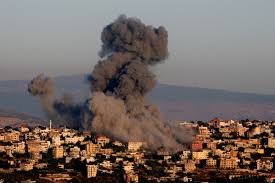
Israel Hamas War: Hezbollah announced the successful completion of the first phase of its retaliatory offensive against Israel, utilizing “a large number of missiles” in response to the killing of commander Fuad Shukr at the end of July.
In a statement released on Sunday, the Lebanese group reported launching over 320 Katyusha rockets targeting 11 Israeli military bases and barracks, including the Meron base and four locations in the occupied Golan Heights. This response had been anticipated for weeks, following a series of targeted assassinations of senior commanders from both Hezbollah and Hamas, raising concerns about a potential escalation in the region.
Hezbollah stated that the strikes aimed to “facilitate the passage of drones” to reach deeper targets within Israel, claiming that the drones were deployed successfully as planned.
In a counteraction, Israel conducted a series of airstrikes on southern Lebanon early Sunday, describing the operations as “preemptive” following the detection of Hezbollah’s preparations for an attack on northern Israel.
Since the onset of Israel’s war on Gaza in October, Hezbollah and Israel have engaged in a series of retaliatory attacks across their border, but this marks a notable escalation in hostilities.
Reports indicate that most Israeli strikes were concentrated in the border area, extending up to 5 kilometers (3 miles) deep along the 12-kilometer (74-mile) border. The region has been declared a military zone, with civilians evacuated and subjected to repeated airstrikes by the Israeli military in recent months.
Israeli Prime Minister Benjamin Netanyahu convened a Security Council meeting on Sunday morning, while Defence Minister Yoav Gallant has declared a “special situation,” implementing a 48-hour nationwide state of emergency starting at 06:00 AM (0300 GMT) on Sunday. Ben Gurion Airport was temporarily closed, and reports of injuries in northern Israel surfaced, prompting cities to open public bomb shelters.
As the initial wave of attacks in southern Lebanon reportedly concluded, observers await updates from the Israeli military regarding potential further strikes, which could provoke additional responses from Hezbollah and escalate the conflict.
Experts highlight that, despite the increasing intensity, both Hezbollah and Israel appear to be attempting to avoid a full-scale war. The Israeli military has indicated that it will target any threats, while concerns grow that the ongoing conflict could draw the entire region into a broader war.
The United States reaffirmed its support for Israel’s right to defend itself, with senior officials maintaining ongoing communication with their Israeli counterparts.
As discussions aimed at resolving the ongoing war in Gaza continue in Egypt, Hezbollah has indicated a willingness to cease hostilities if a ceasefire is established. However, the prospects for a diplomatic resolution remain uncertain, with Israel seeking to alter the rules of engagement to facilitate the return of evacuated Israelis from northern Israel.






